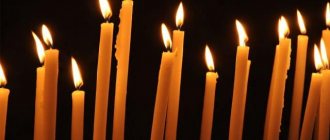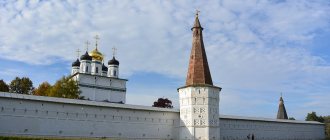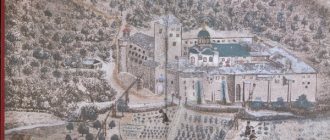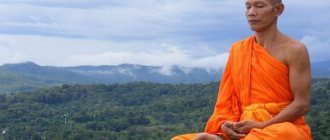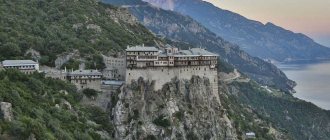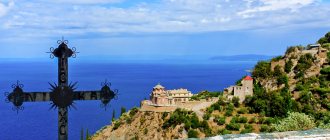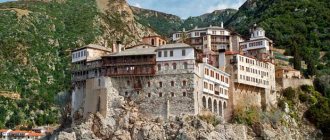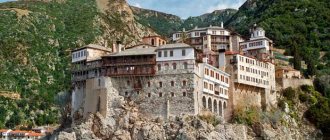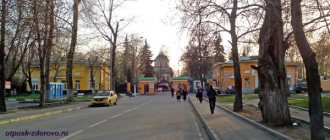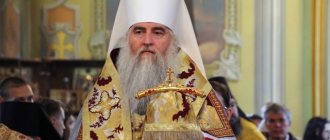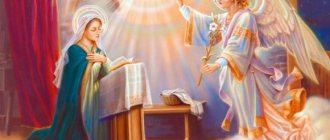| Elder Joseph the Hesychast. Photo |
Joseph Isihast (silence, cave)
(Greek ᾿ιωσὴφ ὁ ῾ησυχαστής) (1897 - 1959), chemones, an outstanding ascetic of piety of the 20th century, the local respectable saint on Athos and Romania, the reverend of August 16 (Const. [1])
In the world Frangisk Kottis was born on November 2, 1897 in the village of Lefke on the island of Paros. His parents George and Maria were poor but pious people. In 1907, the father died, and raising six children fell on the shoulders of the mother. According to her, soon after the birth of Frangis, she learned about his upcoming fate: an angel who appeared to her in a dream wrote down the baby’s name on a certain list and took him away, saying that the Tsar needed him.
Frangisk did not finish primary school, because after the death of his father he had to help his mother and brothers. In 1914 he went to work in Piraeus. After completing military service, he settled in Athens, where, according to some sources, he was engaged in small trade, and according to others, he worked as a cook and then as a tram conductor. At the age of 23, the young man became interested in reading spiritual literature, under the influence of which he began to imitate the ascetic life of the ancient fathers on Mount Pendeli. In the same year, 1921, having met a certain elder from a cell in Kareya, Frangisk distributed his property to the poor and went to the Holy Mountain to become a monk.
On Athos, he first joined the brotherhood of Elder Daniel of Katunaki, but then left there in search of a more secluded place for asceticism. The young man was unable to immediately find a spiritual father for himself, about which he later wrote with bitterness: “Day and night I cried because I did not find the Holy Mountain as the saints write about it.”
. In particular, his attempt to become a disciple of Elder Callinicus the Hesychast was unsuccessful, since he refused to teach his novices mental prayer. Then Frangisk began to lead a hermit life, living in caves. Over time, after many harsh deeds, he was awarded the gift of grace-filled unceasing prayer.
| St. Joseph the Hesychast. Greek icon |
Not finding a suitable shelter, Frangisk traveled around Mount Athos for some time, making a living by making brooms. During these wanderings, he met and became close to the monk Arseny. On the advice of Daniel of Katunaki, who pointed out to young people the importance of obedience for spiritual life, at the end of 1921, Frangisk and Arseny became students of the simple-minded and kindly elder Ephraim of Katunaki, an Albanian by birth, engaged in the craft of cooperage.
| Prpp. Paisius the Svyatogorets, Jacob of Euboea, Porfiry Kavsokalivit and Joseph the Hesychast. Greek icon |
In 1925, Frangisk was tonsured into the great schema with the name Joseph.
Shortly before his death, Elder Ephraim moved to the monastery of St. Basil the Great, where he soon died. After his death, Joseph, yielding to the request of his brother, assumed the responsibilities of the head of the community, although Father Arseny was older both in years and in terms of the time of monastic tonsure. Left alone, Joseph and Arseny continued traveling around Athos, returning to their kaliva only for the winter, and then decided to live there permanently, doing wood carving. According to the memoirs of Joseph the Hesychast, this period of his life was associated with especially difficult temptations. So, one day the elder saw in a vision a long line of monks preparing to fight demons. The tall and glorious military leader invited him to stand in the first row of fighters, to which Joseph happily agreed. The vision was followed by a fierce spiritual warfare that lasted 8 years, as a result of which Joseph the Hesychast, in his words, “entered all the refuges of the enemy and, after fierce combat, came out of them by the grace of the Lord.”
. An important event in the life of the ascetic was the acquisition of a spiritual father, Elder Daniel, a silent and almost complete recluse, who monasticized in the cell of St. Peter of Athos in the vicinity of the Great Lavra. From his confessor, Joseph the Hesychast adopted the rule of eating food (consisting of one measure of bread and a small amount of vegetables) only once a day, making no exception for great holidays. During his stay in the monastery of St. Basil the Great, a small monastic brotherhood began to form around Joseph the Hesychast. The elder was joined by his brother Athanasius, Father John from Albania and Father Ephraim (later a hieromonk who led the Old Calendar movement in the city of Volos). For some time, the famous ascetic monk Gerasim (Menaias) was also a novice of Joseph the Hesychast, who, despite the fact that his health did not allow him to remain in the brotherhood for a long time, always remembered the elder with deep respect. Since the ascetics began to live permanently in their kaliva, Joseph the Hesychast acquired great fame, and many visitors came to him for advice. This circumstance disrupted the secluded atmosphere, prompting the founders of the brotherhood to look for a new place for monastic deeds.
In 1929 and 1930, Joseph the Hesychast left the Holy Mountain to tonsure his mother as a nun and found a nunnery in the vicinity of the city of Drama. In 1933 he returned to Athos, continuing to direct the five nuns he had tonsured through correspondence.
In January 1938, Joseph, together with Father Arseny, looked for an abandoned kaliva in the Small Skete of St. Anna, located in caves under a rocky cliff, where they labored for the next 30 years. The ascetics renovated the small church of St. John the Baptist and built for themselves a hut from wood, twigs and clay, divided into three cells, one of which was intended for Joseph, the other for Arseny, and the third for the visiting hieromonk. Here Joseph and Arseny were left alone again for some time. The very location of the kaliva and the lack of space for living quarters did not suggest the presence of other brethren. Nevertheless, over time, new students from among the young monks joined the ascetics, including Monk Joseph (later confessor of the Vatopedi monastery and biographer of the elder), Hieromonk Charalampius (later abbot of the monastery of St. Dionysius).
| Head of Rev. Joseph the Hesychast. Monastery of St. Anthony the Great, chapel of St. Vmch. Panteleimon (USA, Arizona). |
The hardships of life in the Little Skete of St. Anna, associated primarily with the need to lift loads to great heights every day, had a bad effect on the health of young novices, so in June 1951 Joseph decided to move closer to the sea.
He chose the kaliva of the holy Unmercenaries in the New Skete. At the beginning of 1958, the elder’s health deteriorated sharply, and a painful abscess appeared on his neck. Yielding to the requests of his spiritual children, he agreed to accept treatment, although he considered the efforts of doctors unnecessary. In 1959, Joseph the Hesychast suffered from heart failure. He died on August 28, 1959, on the day of the Dormition of the Most Holy Theotokos, having predicted his death and having previously received communion at the festive Liturgy.
Reverence
The Monk Joseph the Hesychast was revered as a locally revered saint on Mount Athos [2], as well as in Romania. On March 9, 2022, the Patriarchate of Constantinople canonized him as a saint with the establishment of his memory on August 16 [3].
The relics of St. Joseph are in Vatopedi, and the venerable head and other part of the relics are in the monastery of St. Anthony the Great (Arizona, USA). It is known about the posthumous appearances of the elder and about the miracles that took place during the transfer of his relics.
| St. Joseph the Hesychast. Russian icon |
Our teachers and their lessons
– Do you personally know the disciples of St. Joseph - Father Ephraim of Arizona and others - or the disciples of his disciples? If yes, then tell us about them, please.
– We had the good fortune to meet the spiritual child of Father Joseph, whom we found - Father Ephraim of Philotheus (Arizona). A popular documentary film was made about him, a lot is written about him, and his books have also been published in both Georgian and Russian. In general, as the Lord teaches us, “a tree is known by its fruit” (Matthew 12:33; Luke 6:44) - and look, what is the fruit of Father Joseph!
It is very difficult to establish monasteries of the type in America that Father Ephraim created. His missionary work was very unconventional: he did not know English; As a rule, he missionized verbally to a lesser extent; the main tool of his missionary work was internal prayer.
And the fact is obvious. The monasteries he created are simply amazing, especially the monastery he built in Arizona. The monks there are filled with joy, constantly praying and taking communion. The missionary work of these monasteries, like the missionary work of Father Ephraim, stems from the way of life.
Truly the candle lit on the table and the city built on the top of the mountain were Father Ephraim and his brethren in America and truly an example of how missionary work should be done. And there is nothing new in this: the Lord teaches us to be the light of this world, and our light should shine so that, seeing it, other people also begin to seek God (see: Matt. 5: 14-16). That candle that burns in our heart from the Christian faith must, as the Apostle Peter says, turn into the sun, into the dawn (see: 2 Pet. 1:19). And Father Ephraim was the kind of person who in his heart turned that candle that burns in the heart of every Christian into the sun. And he turned it into precisely that practice, devoted adherence to the school that Father Joseph founded. And in his life we read how it was. This is what Father Ephraim says, for example: “The purpose of our life, its meaning was in the Jesus Prayer, we breathed it.” They lived it, that's the point! In addition, they had an intense Eucharistic life - and the result is obvious.
What else can I say? Those who read Father Ephraim’s book “My Life with Elder Joseph” probably remember what a sense of humor he had. And he maintained this humor until the end of his life. And when we met with him, it was still felt. Although the old man was already in deep weakness, he had this simple humor caused by happiness, a happiness that he constantly carried within himself.
At the same time, some kind of strength was felt in him: when he passed somewhere, there was a desire to press against the wall. But he had a small body, one might say that he was fragile, like a sparrow, but he had great inner strength. Yes, someone may say that this is a purely psychological moment based on his authority, but still everyone noted that he was endowed with some amazing inner strength.
You know, even if there is a psychological element here, you can’t escape the facts. A man comes to America and, in a not so long period of time, founds as many as 18 monasteries! What is it like to found at least one such monastery, especially in a country where Orthodoxy is far from the main religion? Even using the example of Georgia, I can say that it is quite difficult to do - to found monasteries of this type. Therefore, the feeling in Elder Ephraim of this force cannot be considered a purely subjective moment - it was a reflection of objective reality. This is our opinion.
As for the other disciples, thank God, we have communication with Father Paisios (Papaioanu), abbot of the monastery in Arizona; also with the rector of Vatopedi, Father Ephraim, from whom we learned a lot; also with Bishop Athanasius, Metropolitan of Limassol, from whom we learn many things.
What can you say about them? I will emphasize: I want to talk about the Liturgy performed by these people and the clergy trained by them. We know, we have all read how Saint John of Kronstadt served the Liturgy. The way he served, no one served like that, his contemporaries remember. Unfortunately, today we cannot see or hear how this great saint, one of my most beloved saints, served. But still the conclusion suggests itself that the service can be held more majestic or less majestic.
What characterizes this school is the way in which worship is performed. How is it shown? Not in form, of course, but in something internal, in some nuances that are difficult to convey in words. This is extreme reverence for the altar, this is extreme freedom combined with reverence, but not in forms, of course. I mean inner freedom.
The amazing intonation of the voice, which is not artificial, but absolutely natural and comes from the heart, and this indicates the hesychast state of the ministers, the existence of hesychast practice among them. Ideally, the Liturgy is the crown of hesychast practice, and it should be so.
If a person does not have the experience of going deeper into himself, of searching for God within himself, then the Liturgy he performs will naturally be of a more external nature and it will help less people who are called to participate in the Eucharistic service. In the service of those whom I have listed, and in the service of their pupils, this is precisely what is implied: service performed with an inner hesychast mental attitude. That's how I perceive it.
We learned a lot from them. I repeat once again: this learning is not just verbal: write something down, someone told you something. You need to touch it, it is transmitted through touch. I told you about Father Ephraim that he had amazing inner strength, and you could feel it. Communication with such people once again confirms the truth that the principle of succession in spiritual life - from mentor to spiritual child - is extremely important. Because there is a lot that you simply cannot read from a book. No matter how it is written, it cannot be perceived. Much is perceived simply by touch: you need to come, see, touch and experience. Therefore, I always advise those who ask, especially those who wish to serve in monasticism or the priesthood in the future, who study in theological educational institutions, that they must have a certain connection with representatives of this school. It is very important.
Prayers
Troparion, tone 5
Reverend Father Joseph,/ having holyly served the Lord and the Mother of God,/ you ascended the new land under the new Heaven promised by God in Paradise,/ and to us, unworthy of dwelling in this,// With your letters and prayers help me to be saved.
Kontakion, tone 8
Chosen by the Lord Jesus to become disciples like the ancients, / You were empowered by the Life-giving Holy Spirit, / You also grew selfless and humble brethren, / You taught the work of unceasing prayer ́,/ and for the sake of their acquisition of perfect gifts,/ even to death you labored with fasting, vigil and sobriety ,/ now you are comforted in the Lord,/ with the Angels and the saints you are blessed and hear:/ Rejoice, Great Hesychast Joseph, // New Athos hermit and Teacher of monks.
Essays
A large number of letters from Joseph the Hesychast to his relatives and spiritual children, devoted to various issues of spiritual life, have been preserved. A selection of these letters was published by Elder Ephraim of the Philotheus Monastery under the title “Expression of Monastic Experience” [4].
The elder also penned the work “The Ten-Voice Spirit-Moved Trumpet”
[5], where the steps that an ascetic must overcome on the path to acquiring grace are described in figurative form. The elder's works are characterized by a unique style, combining archaism with popular expressions and the use of rhymed prose.
For a long time, Frangiskos could not find an experienced spiritual mentor.
For a very long time he could not find an experienced confessor as a mentor. After which he decided to become a hermit. Simple local caves served as a haven for him to live.
He earned his living by various labors, he was engaged in the manufacture of brooms. Soon during his journey through the lands of Athos, the boy met a like-minded monk Arseny. And they soon together passed under the teaching and obedience of the Albanian elder, Ephraim of Katunaki.
Frangiskos and Arseny together came under the teaching and obedience of the Albanian elder - Ephraim of Katunaki
Literature
- Ιωσήφ Βατοπαιδινός, γέρων. ῾Ο Γέροντας ᾿Ιωσήφ ὁ ἡσυχαστής. ῞Αγιον ῎Ορος, 1983, 2005 7 (Russian translation: Joseph, Monk. Elder Joseph the Hesychast / TSL. Serg. P., 2000);
- idem. Γέροντας ᾿Ιωσήφ ὁ ἡσυχαστής: Βίος - Διδασκαλία - "῾Η Δεκάφωνος Σάλπιγξ" / ῾Ιερά Μεγίστη Μονή Βατοπαιδίου. ῞Αγιον ῎Ορος, 2001 5;
- idem. World history, 1886-1983.
- Συνασκητής Γέροντος ᾿Ιωσήφ τοῦ ῾Ησυχαστού. Λευκωσία, 2002;
- ᾿Ιωσήφ Μ. Δ. ῾Ο Γέρων ᾿Αρσένιος ὁ Σπηλαιώτης. Θεσσαλονίκη, 2002 2;
- ᾿Αφιέρωμα εἰς τόν ὅσιον Γέροντα ᾿Ιωσήφ τόν ῾Ησυχαστήν. Κύπρος, ῾Ιερά Μονή Μαχαιρᾶ, 2003;
- ᾿Εφραίμ (Κουτσού), ἀρχιμ. ῾Η ὑπακοή κατά τόν Γέροντα ᾿Ιωσήφ τόν ῾Ησυχαστή // Σύναξις Εὐχαριστία ς, χαριστήρια εἰς τιμήν τοῦ Γέροντος Αἰμιλιανοῦ. ᾿Αθῆναι, 2003. Σ. 247-268;
- Αἴσθησις ζωῆς ἀθανάτου. ῾Ομιλίες γιά τόν Γέροντα ᾿Ιωσήφ τόν ῾Ησυχαστή. ῾Ιερά Μεγίστη Μονή Βατοπαιδίου, 2005 2;
- ᾿Αλιπράντης Ν. Χ. Γέρων ᾿Ιωσήφ ὁ ῾Ησυχαστής. ᾿Από τήν Πάρο στίς σπηλιές τοῦ ῎Αθω. ᾿Αθήνα, 2006;
- Τριαντάφυλλος Γ. ῾Ο Γέροντας ᾿Ιωσήφ ὁ ῾Ησυχαστής. ῾Ο Νηπτικός Πατήρ καί Διδάσκαλος: Ταπεινή ἀναφορά στήν ζωή καί στό ἔρ γο του. Πάρος, 2007;
- Γέροντας ᾿Ιωσήφ ὁ ῾Ησυχαστής. ῞Αγιον ῎Ορος, 2007;
- Ephraim (Kutsu), archimandrite. The personality and works of Elder Joseph the Hesychast // Russia - Athos: a millennium of spiritual unity: Int. scientific-theological conf. Moscow. 1-4 Oct. 2006 M., 2008. P. 31-39;
- aka. The influence of Elder Joseph the Hesychast on the ascetic and liturgical life of the Holy Mountain // Ibid. pp. 39-42;
- Kalliakmanis V., protopr. The gift of discernment of thoughts in the life and teaching of Elder Joseph the Hesychast // Ibid. pp. 42-50;
- Manzaridis G. Purity of mind and heart according to the teachings of Elder Joseph the Hesychast // Ibid. pp. 50-55.
To a young man asking about prayer Elder Joseph the Hesychast
My beloved brother in Christ, I pray that all is well with you. Today I received your letter and I want to answer all your questions. The teaching you need requires neither time nor effort to think about and answer. Mental prayer for me is something I have been doing for over 35 years.
When I came to the Holy Mountain, I immediately rushed in search of those who could help me in mastering prayer, and now, looking back at these past years, I see that then there were a lot of those who lived by prayer, virtuous people, elders of the past.
We chose one of them to be our elder and also received guidance from the others. Now, starting to master mental prayer, you must constantly force yourself to pray without stopping. To begin with, very quickly, so that the mind does not have time for dreams and thoughts. Concentrate all your attention on the words: “Lord Jesus Christ, have mercy on me.” When a prayer is spoken with the tongue for a long enough time, the mind begins to get used to it and sometimes already says it itself. Over time, the prayer becomes sweet, as if you had honey in your mouth, and you want to say it constantly. And if you stop, you feel great discomfort.
When the mind gets used to prayer and is filled with it, then, if everything has been done correctly before, the mind itself sends prayer to the heart. Since the mind supplies the soul with food, its task is to send this food (both good and evil, what the mind finds) to the heart, which is the center of mental and spiritual activity of a person, the “throne for the mind.”
Therefore, when someone, while saying a prayer, keeps his mind from daydreaming and imagining anything and concentrates his attention only on the words of the prayer, then with breathing and the utmost motivation of himself, he brings the mind down to the heart and, remaining there as in a cage, rhythmically pronounces the words of the prayer: “Lord Jesus Christ, have mercy on me!”
At first, he says the prayer several times in one breath, later, when the mind gets used to staying in the heart, he says the prayer with each breath: “Lord Jesus Christ” - on the inhale, “have mercy on me” - on the exhale. And so he forces himself until grace itself covers the soul and acts on its own. This is what “theory” is all about. Prayer happens everywhere; sitting, lying down, walking, standing. “Pray without ceasing. Give thanks in everything,” says the Apostle (1 Thess. 5:17–18).
It is not enough to pray just before going to bed. Prayer is a battle. When you get tired, sit down, then get up again so that sleep does not consume you. This is praxis (practice). You show your will to God, because it depends only on Him when and what to give you. God is the beginning and the end of everything. His grace is the driving force that brings everything into being. When love appears, you understand how to follow, how to truly fulfill the commandments. You get up at night and pray, you see a sick person and have compassion for him, you see a widow, an orphan and give to them, and the Lord loves you, and you love Him. He loves first and pours out His grace, and we return it to Him, which is “Thine from Thine.” Therefore, if you seek to find Him through prayer, do not allow one breath to come without it. Just be careful and don't accept any fantasies. God has no form, image, color. He is absolutely perfect and indescribable. It acts like an elusive peaceful breeze in the mind.
Repentance comes when you realize how much you grieve God, who is so kind, sweet, merciful and full of love, who was crucified and suffered for each of us. When you reflect on this and other things related to the Lord's suffering, it brings a feeling of repentance.
So, if you can, repeat the prayer without stopping for two or three months, and you will gain the skill, then grace will cover and restore you. Repeat quietly, when the mind gets used to it, stop saying the prayer with your tongue and let your mind do it. When he stops, again support the prayer with your lips. Verbal prayer is necessary at first, then throughout your life the mind will create prayer on its own, without any effort. When you come to the Holy Mountain, visit us. We will talk to you about other things, there will be little time for prayer, and besides, when visiting monasteries, your mind will be distracted by what you see and hear.
I'm sure you will find prayer. Without any doubt. Just knock persistently on the door of divine mercy, and Christ will, of course, open to you. It's impossible not to be. The more you love Him, the more you receive. His gift, whether it be great or small, depends on your love, whether it is great or small.
